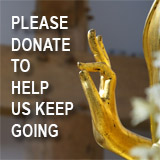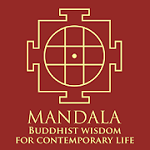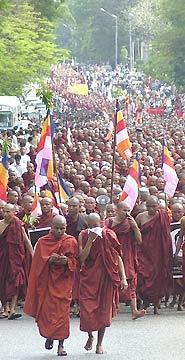
|
|
|
Home Asia Pacific South East Asia Myanmar Myanmar Protest News An enlightened politicsby Madeleine Bunting, International Movement For A Just World (JUST), Oct 11, 2007Kuala Lumpur, Malaysia -- They are extraordinary images: thousands of monks and nuns marching for democracy on the streets of Burma's cities. The shaved heads, the naked shoulders, the richly coloured cotton robes: all symbols of one of the most ascetic and enduring of monastic traditions in the world.
Now, an extraordinary alliance between some of the most senior monastic leaders and a younger generation of militant monks is presenting the dictatorship with its biggest challenge in nearly two decades. The monks are leading this protest movement; some reports have even suggested that the monks have urged the laity to stand back and let the monks themselves take the risk of confronting the regime, knowing that their status gives them some small degree of protection. The monks are calculating that any mistreatment they receive will only increase their public support; they are using their status as a means to mobilise people against the regime. And all the time the monks have insisted on the unconditional Buddhist principle of non-violence and urged their lay colleagues to do the same. We are witnessing one of the most extraordinary demonstrations of religiously inspired courage and political engagement for the benefit of others.
Burmese Buddhism is not just the exception which proves the rule. Buddhist monks played an important role in Vietnam in the anti-war movement; there were several cases of suicide by self-immolation. A terrrible, dramatic way to highlight the plight of their country which shocked the world. Buddhism, contrary to some lazy western assumptions, is not just about meditation, feeling calm and achieving personal enlightenment; what sometimes has been missed from western accounts of this faith tradition is its radicalism and that the Buddha was a social reformer who spoke out against the injustices of his time such as the caste system. Through Buddhist scripture there is a clear understanding of good governance. So one cannot help but wonder quite how the batch of critics of religion will interpret the role of the Buddhist monks. Christopher Hitchens has recently argued that religion poisons everything and goes on to insist that no progressive political movement has had any religious influence. He insists that a figure like Martin Luther King Jr was in no real sense a Christian. How will he explain the Burmese monks? Will Richard Dawkins accuse these monks of child abuse for encouraging young boys to join their monasteries? It would be sophistry to argue that Buddhism does not talk of a God and that it is not a "real" religion (an old and tired debate). It's not that we should regard Buddhism as having a uniquely positive contribution to make to politics. Things aren't so clear cut - it plays a positive role in some places, and not others. Burma's Buddhist traditions are closely linked to those of Sri Lanka. Both are Theravada, but in Sri Lanka, the sangha have played a reprehensible role in Sinhalese nationalism. The point is that you cannot generalise about the role of religion in politics. At some points in human history it has been a malign and terrible influence, at others, it has been critical to the development of progress and challenging injustice, as Tristram Hunt wrote on this site recently. In recent years, we have seen a lot of the former which is what makes these images of monks and nuns so powerful. They are reminding us all that faith can inspire great courage, dignity and compassion. |
 Get your Korean Buddhist News here, brought to you by BTN-Buddhist Channel |
 |
 The Mandala app brings together Buddhist wisdom and meditation techniques with the latest insights of psychology and neuroscience to handle the challenges and complexities of modern life. The App offers a series of engaging talks and conversations with experts on a wide variety of topics, such as managing stress, dealing with adversity, developing greater resilience, cultivating empathy and compassion, creating healthy relationships, and many more. These topics are explored to help find greater peace, meaning and joy in our lives. Our panel of experts include Dr, Thupten Jinpa, Daniel Goleman, Kelly McGonigal and others.FREE DOWNLOAD here |
| Point
your feed reader to this location |
| Submit an Article |
| Write to the Editor |

 The Buddhist sangha - the collective term for these monks - is the only institutional structure outside government control which has managed to survive four decades of military dictatorship. It has survived because of the enormous respect it wields in devoutly Buddhist Burma. The government has known that it challenges the sangha's huge moral authority at its peril.
The Buddhist sangha - the collective term for these monks - is the only institutional structure outside government control which has managed to survive four decades of military dictatorship. It has survived because of the enormous respect it wields in devoutly Buddhist Burma. The government has known that it challenges the sangha's huge moral authority at its peril.